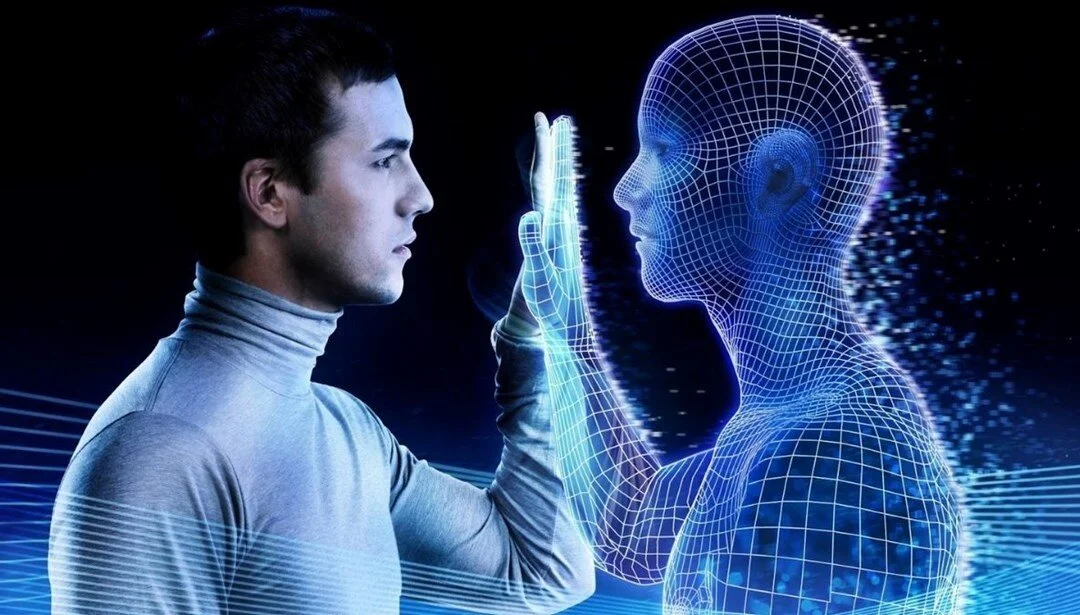Consciousness can’t be uploaded
Uploading minds to computers isn’t just technically impossible—the whole idea rests on a deep misconception of consciousness and our place in reality. So argues William Egginton, whose recent book explores the relationships between the philosophies of Kant, Heisenberg and Borges. Drawing a parallel between minds and spacetime singularities inside black holes, he argues that to try to know such things involves trying to go beyond mere appearances to reality as it is in itself—a futile project, he claims. And if minds cannot be truly known, they certainly can’t be copied or uploaded to computers. Futurists like Ray Kurzweil and Dmitry Itskov, who aim for cybernetic immortality, are chasing a metaphysical mirage.
Uploading minds
Philosophers often talk about consciousness as if it were a problem. Better yet, two problems: a hard one and an easy one. The so-called easy one (which the psychologist Steven Pinker has joked is about as easy as getting to Mars) merely involves explaining how the brain evolved to perform the complex tasks we associate with human intelligence, such as judging, deciding, communicating decisions through language, and acting upon them. The hard problem, in contrast, refers to the goal of explaining how the brain produces the experiences we associate with every aspect of being alive: the sensations of colors, sounds, flavors, or the experience of being someone who exists here and now and needs to decide about what to do or where to go next. Some philosophers have thrown up their hands in frustration at just how hard a task explaining all that is; others have just thrown the task away, denying there even is a problem in the first place. For those who have decided to take it seriously, a curious genre of inquiry has taken root, in which horror, science fiction, and fantasy become the staging ground for thought experiments about what in fact accounts for human experience.
One common trope in these musings is that my first-person experience of the world might be something transferable from my body. Of course, this idea is neither new nor limited to philosophers using science fiction to speculate about consciousness. The same conceit animates ancient and current religious beliefs about the immortality of the soul and reincarnation. In Plato’s dialogue Phaedo, we learn of Socrates’s belief that his own soul will survive his death. A more recent manifestation of this trope imagines consciousness as pure information, something one could code into software and upload onto a mainframe prior to death, thus extending life indefinitely. Indeed, the futurist Ray Kurzweil, who popularized the use of the word “singularity” for the ever-approaching moment when humans and machines merge, is reportedly planning to upload his memories as soon as such an interface becomes possible. He already created an AI version of his father, which he claims, despite its relatively rudimentary form, allows him to experience a kind of relationship with him beyond the grave. But thinking of the first-person experience of existence as something we could ever fully explain, reproduce, gain access to, or transfer between bodies entails a singularity in a very different sense from the one Kurzweil is counting on.
The unreality of space and time
In a recent article about black holes for IAI News, I proposed that, rather than think of these massive, cataclysmic tears in cosmic spacetime as objects that exist out there in reality, we instead treat them as evidence of the idealist thesis that we are confined to a world of appearances with no access to the real world as it exists apart from how it appears to us. This world breaks down in seemingly paradoxical ways when we fail to recognize its inherent limits and treat it as though it were reality itself.
The idea for this proposal came not from physics, but from literature and philosophy—specifically, from a strange and beautiful quotation from Jorge Luis Borges, according to whom we have “dreamt the world. We have dreamt it as firm, mysterious, visible, ubiquitous in space and durable in time; but in its architecture we have allowed tenuous and eternal crevices of unreason that tell us it is false.” Some of these crevices, he tells us, appear in the paradoxes of Zeno and the antinomies of Kant. In that article, I tried to show how the spacetime singularity at the center of a black hole exemplifies the paradox of Achilles and the tortoise, because the time it takes to reach the singularity slows down the closer one gets to it, so that one can never finally reach it. Here I want to suggest that a similar paradox emerges when we treat consciousness as an object of knowledge, by which I simply mean something that can be studied and understood externally.
Zeno’s paradoxes were intended to show that motion, and hence change of any kind, is an illusion; that all that exists is one unchanging reality. His most famous paradox imagines speedy Achilles trying to catch up with a poky tortoise and failing, because he has to cross an infinite number of ever-smaller distances in order to do so. But he also cites a simpler version of that same paradox in which an arrow fails to cross any distance, no matter how short, because the distance in question can also be subdivided infinitely. Indeed, by the same logic, I can’t age, because in order to become a minute older, I must first age a half a minute, and before that a quarter of a minute, and so on ad infinitum. As Zeno’s teacher Parmenides put it in a famous debate with Socrates, for a thing now to become something even slightly different a moment later, it must pass through another stage—he calls the moment of change a “curious creature”—when it is no longer the thing it was and not yet the thing it will become.
For Zeno and Parmenides, these paradoxes are proof that change is an illusion. But even if we don’t accept their conclusion that ultimate reality must then be the opposite of change—the One, something we might picture today as the block universe, a massive, frozen slab of spacetime, existing simultaneously from beginning to end, with no outside, no before, and no after—they still have a point: a being who can measure and observe space and time can indeed conjure an infinite subdivision of space and time that seems to leave them and objects in them, even if only in theory, incapable of change.
But what kind of a being can divide space and time like that? Only a being that can relate to itself a moment earlier and project itself a moment later, or that can relate to other things which lie in one or another direction around it. Such a being can then turn that relation into an abstraction, call that abstraction “time” or “space,” and start dividing it. Without abstracting it first, though, there is no division. The division is never of the real, but only of the abstraction of the real.
Singularities and the elusiveness of the self
Singularities emerge at the limits of our abstractions. We find them when we try to divide space or time to infinitesimal degrees; or cross ever greater distances in limited times; or fit infinite mass into finite space. They emerge when we take for objects of knowledge things that are not possible objects of knowledge, such as space as a whole, seen from the outside; or time as a whole, seen from before it started. And just such a singularity awaits us if we try to get behind the fulcrum from which observation becomes possible so as to observe it, as if it were an object to observe.
I’m using the image of a fulcrum as a visual representation of what Kant called the unity of pure apperception. For Kant, this is the point from which the synthesis of sensory information that is required for there to be experience takes place. Kant calls this point the ego, borrowing from Descartes’ “ego cogito” or “I think,” but immediately denies it the substantiality that Descartes gave it when he reasoned that “I am a substance that thinks,” a res cogitans. Instead, this ego is nothing but a logical function, the necessary accompaniment of any cognition, and should not be mistaken for any kind of substance, whether material or spiritual.
For Kant, turning the logical function of the “I think” into a substance—be it a physical process in the brain, or a ghost in the machine that outlives the human body—is yet another example of reason overreaching the bounds of experience. The result in this case is not an antimony per se but what he calls a paralogism, a case of apparently sound reasoning that leads us to the error of “confounding the possible abstraction of my empirically determined existence with the supposed consciousness of a possible separate existence of my thinking self.” This spurious separable consciousness arises in place of what we actually have, namely, “nothing more in thought than the unity of consciousness, which lies at the basis of all determination of cognition.”
Armed with Kant’s “all-crushing philosophy,” as his contemporary Moses Mendelssohn dubbed it, let’s return to Kurzweil and his desire to outlive his own body. For him to become immortal in any meaningful sense, the memories he uploads would have to be accompanied by something like an experience of being the one who had those memories and continues to have them—otherwise, the immortality in question is nothing more than a more detailed version of a photo album, memoir, or video journal. In other words, the “memories” would be experienced from the outside, by someone else, rather than by Kurzweil himself. What is specific and unique about Kurzweil’s experience is not the memories he experienced, but rather the ego, which synthesizes the elements of consciousness over time, and which was the condition of possibility of having them in the first place. And this unity is, by definition, non-transferable.
When I conceive of another being in front of me—another human, a chimp, a dog, a fly, or a machine—as experiencing the world in some way, I’m implicitly asking the question the philosopher Thomas Nagel famously asked about bats, namely: what is it like to be that being? If I am capable of asking the question, that implies that I can’t have that experience in the sense of being able to step into it and experience it myself. If I could, it wouldn’t be something I ask myself about but instead something I, well, experience—like reading a book or watching a movie, something I tend to do without asking myself what it is like to be that book or be that movie. What we call consciousness, in other words, my experience of being a living being, entails a necessary limit. Specifically, while it entails wondering what it might be like to be other beings, it equally entails not being able to cross that limit and actually experience what it is like to be them.
The term “singularity,” as used in discussions about movable consciousnesses—from reincarnation to computer-enabled immortality—is, then, a remarkably apt term. Like the mysterious limit lurking at the heart of black holes, the singularity of another being’s experience of the world is something we can only ever approach but never arrive at. This is because the very nature of what we are using to approach it—the traversal of space in time, in the case of black holes, or the first-person experience of other beings, in the case of consciousness—dissolves as we try to cross the limit guarding our prize. If our means of moving is spacetime, then a limit that lies on the other side of the dissolution of spacetime becomes, by definition, impossible to reach. In the same way, if our means of knowing something is our first-person experience or consciousness of it, then to take on another person’s first-person experience is impossible, because it dissolves the very means I have of obtaining that knowledge while still being me.
* William Egginton, Decker Professor in the Humanities, Johns Hopkins, and author of The Rigor of Angels: Borges, Heisenberg, Kant and the Ultimate Nature of Reality.
Source: https://iai.tv/articles/consciousness-cant-be-uploaded-auid-3352?_auid=2020






